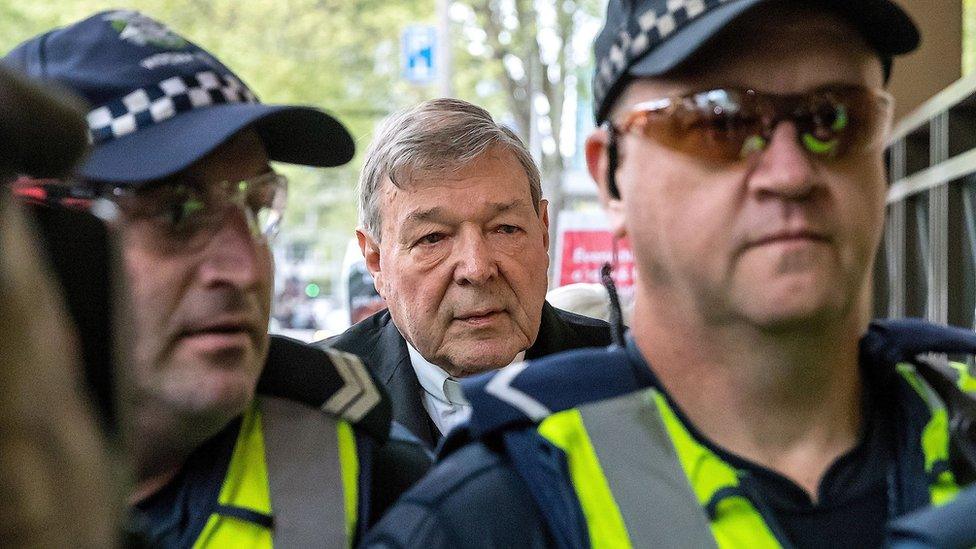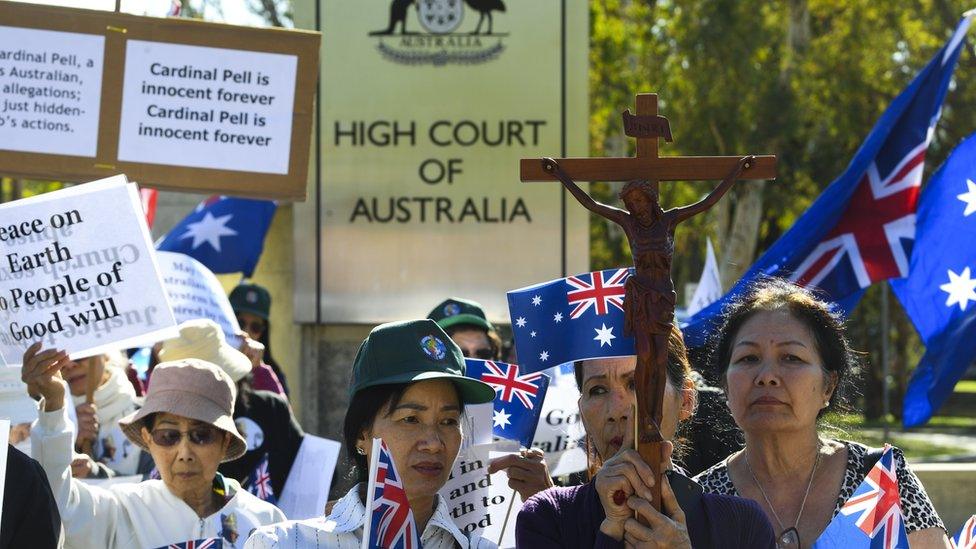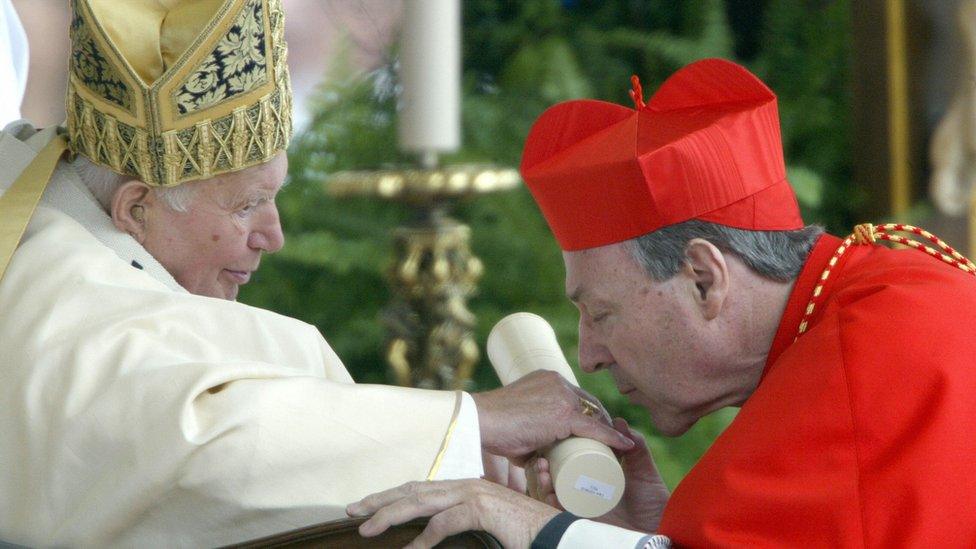George Pell: Court hears cardinal's final bid to quash sexual abuse verdict
- Published

Cardinal George Pell was found guilty of child sexual abuse in 2018
Cardinal George Pell's final bid to overturn his convictions for child sexual abuse has begun hearings in Australia's top court.
The ex-Vatican treasurer is serving a six-year jail sentence after a jury found he abused two boys in a Melbourne cathedral in the 1990s.
Pell is the most senior Catholic priest ever to be found guilty of such crimes.
He is seeking to challenge the verdict by arguing that the jury did not properly consider all evidence.
The Australian cleric, 78, has maintained his innocence since he was charged by police in June 2017.
The case in the High Court of Australia is Pell's last avenue of appeal, after a lower court rejected his first bid to quash the verdict last year.
The conviction has rocked the Catholic Church, where Pell had been one of the Pope's most senior advisers.
The Vatican has been under pressure to defrock the cleric, but it has maintained he deserves a full and fair legal process.
What was the original guilty finding?
In December 2018, a jury unanimously found Pell guilty of sexually abusing two 13-year-old choir boys in private rooms in St Patrick's Cathedral. Pell was archbishop of Melbourne at the time.
The convictions included one count of sexual penetration and four counts of committing indecent acts.
Pell's trial heard testimony from the only surviving victim. The abuse was not witnessed by anyone else, but the trial also heard evidence from dozens of churchgoers.
Activists celebrated when a Victoria court upheld Pell's conviction last year
In sentencing Pell in 2019, Judge Peter Kidd said the cleric had committed "a brazen and forcible sexual attack on the two victims".

Timeline of key events in Pell's case
June 2017: Victoria Police charge Pell with "historical sexual assault offences". The cardinal vehemently denies the charges from Rome
May 2018: A judge orders a criminal trial to go ahead in Australia. Pell formally pleads not guilty
September 2018: The trial ends in a hung jury, prompting a second trial
December 2018: The second jury unanimously finds Pell guilty
February 2018: Media report Pell's conviction for the first time, after a gag order is lifted
March 2019: Pell sentenced to a maximum of six years in jail
August 2019: Pell unsuccessfully challenges the verdict in Victoria's Court of Appeal
September 2019: He lodges a final appeal with the High Court of Australia
11 March: The court begins two days of hearings

What is Pell arguing now?
His central argument is that the jury and previous appeal court relied too heavily on evidence from the victim who testified.
His lawyers have described that victim's testimony as "compelling" but argue it is uncorroborated. They assert the jury did not properly consider other evidence.
"No matter how favourable a view was taken of the complainant, it was not open to the jury, acting rationally, to conclude that the prosecution had eliminated all reasonable doubt," his lawyers argue.
Prosecutors reject these assertions. Two of three appeal judges rejected Pell's first challenge in Victoria's Court of Appeal last year.
Chief Justice Anne Ferguson of that court said: "The complainant was a compelling witness, was clearly not a liar, was not a fantasist and was a witness of truth."
When will there be a decision?
The arguments in Canberra will take place over two days before a full bench of seven judges. They will simultaneously assess whether Pell has a legitimate case for an appeal.
There could be a ruling on Thursday, or the judges could reserve the decision - possibly for months.
Pell, who is in a maximum security prison in Victoria, will not be at the hearings.

Protests outside court
Shaimaa Khalil, BBC News in Canberra
George Pell supporters gathered outside the court holding banners and saying prayers. Some had a picture of Pell stuck on their chest.
They soon came face to face with an anti-Pell protester - each side trying to make their chants heard. It's another reminder of how divided Australia has been over one of the most high-profile cases in its history.

Supporters of George Pell gathered outside the court on Wednesday
Whatever is decided in the High Court of Australia, it will be the final legal chapter in a case that has deeply embarrassed the Catholic Church.

Who is George Pell?
Pell was among the highest-ranking figures in the Church's global hierarchy.
Made a cardinal in 2003, he was summoned to Rome in 2014 to help clean up the Vatican's finances.

Pope John Paul II appointed Pell a cardinal in 2003
He forged a reputation as a disciplined Church leader who held strict conservative views against same-sex marriage, abortion and contraception.
In Australia he circulated among the political elite, and even after his conviction he received public statements of support from two former prime ministers.